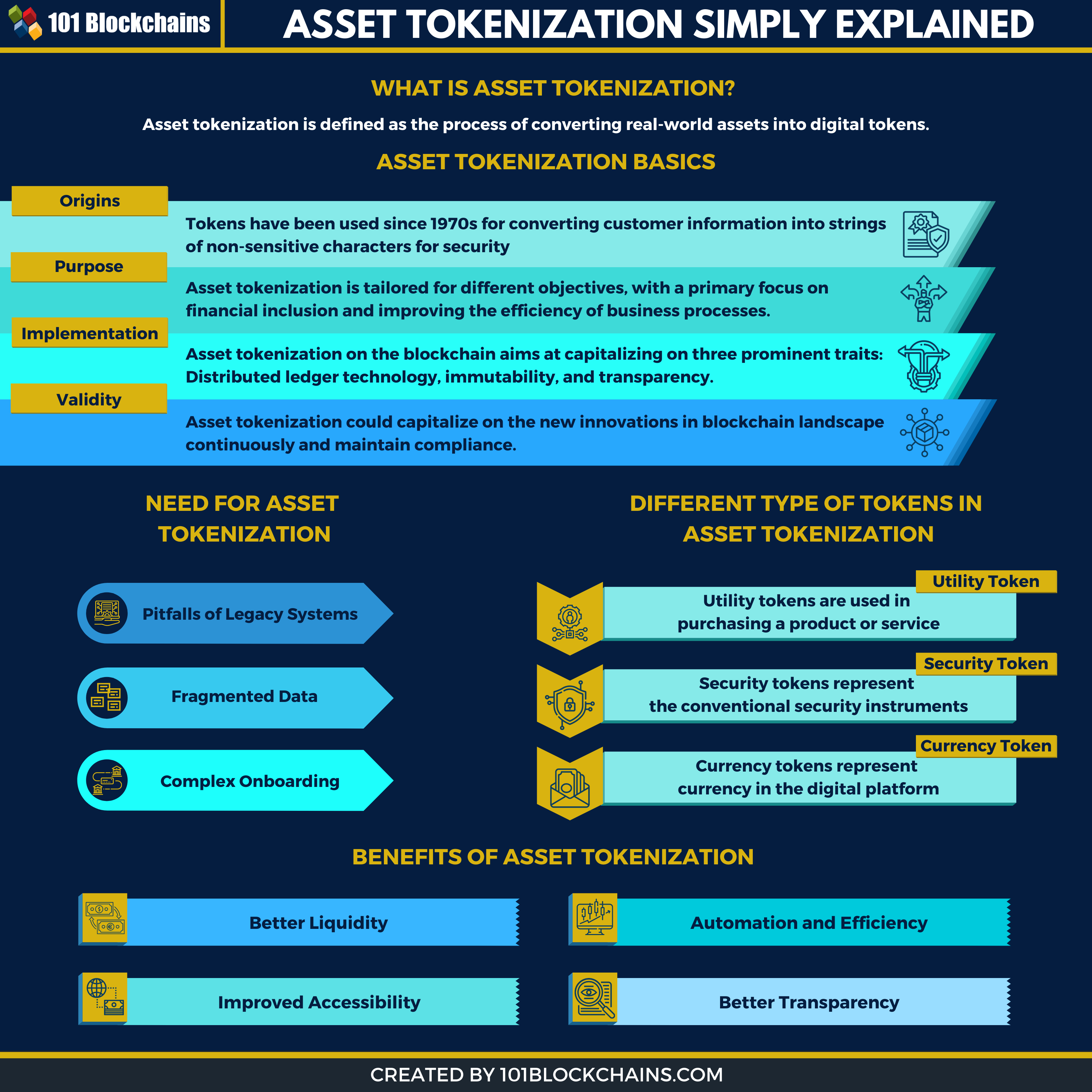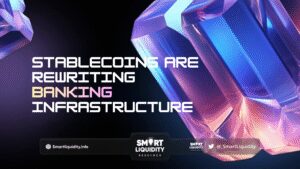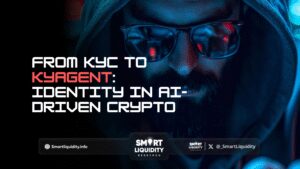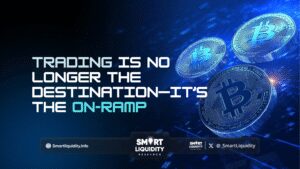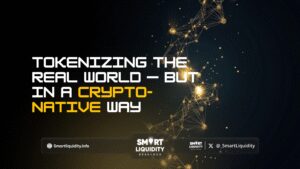Tokenization: Unlocking the Value of Real-World Assets


Tokenization has emerged as a groundbreaking solution that enables the representation of real-world assets as digital tokens on blockchain networks. This innovative technology holds the potential to revolutionize various sectors, including art, finance, and commerce. By turning assets into tokens, tokenization unlocks new avenues for investors, improves liquidity, and enhances accessibility. In this article, we delve into the world of tokenization and how it is transforming the way we perceive and interact with real-world assets.
Tokenization refers to the process of converting tangible or intangible assets into digital tokens on a blockchain network. It involves representing the ownership or rights of an asset as a unique digital token, which can then be securely stored, transferred, and traded on the blockchain. Tokenization provides several benefits, such as fractional ownership, increased liquidity, enhanced transparency, and improved efficiency.
In the context of blockchain technology, a token represents a digital representation of an asset, whether it is a physical asset like real estate or art, or an intangible asset like loyalty points or intellectual property. These tokens are typically created and managed through smart contracts, which are self-executing agreements coded on the blockchain.
Tokenization and Art: Redefining the Art Market
The art market has long been an exclusive domain, accessible only to a select few with significant financial means. However, the emergence of tokenization is redefining the art market by revolutionizing ownership, accessibility, and investment opportunities.
Tokenization has brought significant changes to the art market, democratizing ownership, increasing liquidity, and creating new revenue streams for artists. Through fractional ownership, investors can participate in the art market with lower barriers to entry, while artists benefit from increased exposure and monetization opportunities. Tokenization also improves transparency and trust by providing secure verification of artwork provenance. As the art market continues to evolve, tokenization stands at the forefront, reshaping the way we perceive and engage with art.
Through tokenization, art is becoming more inclusive, liquid, and globally connected. Artists have new avenues to showcase their work, collectors can own unique digital assets, and investors can participate in the art market with greater ease. Tokenization is unlocking the true potential of art, making it more accessible and lucrative than ever before.
Tokenization and Iconic Products: From NFTs to Exclusive Collectibles
Tokenization extends beyond the realm of art and is also revolutionizing the market for iconic products. From limited-edition sneakers to luxury goods, tokenization enables the creation of non-fungible tokens (NFTs) and exclusive collectibles.
Tokenization has given rise to NFTs, which represent unique digital assets on the blockchain. NFTs have gained significant popularity in the world of iconic products, as they allow for the digital representation of collectibles.
Tokenization enables the creation of exclusive collectibles with limited supply, enhancing their desirability and value. By tokenizing iconic products, such as limited-edition sneakers or designer handbags, each item can be represented by a unique token, ensuring scarcity and authenticity. This creates a sense of exclusivity and rarity for collectors, who can securely own and trade these digitally tokenized versions of coveted physical goods.
Through tokenization, these products are digitized, creating new avenues for ownership, trading, and investment. NFTs enable the digital representation of unique collectibles, bridging the physical and digital worlds. Tokenization also provides a platform for secondary market trading, allowing collectors to capitalize on the value appreciation of their iconic products. As tokenization continues to evolve, it holds the potential to transform the way we engage with and invest in iconic items.
Tokenization and Real Estate: Opening Doors for Global Investors
Tokenization has brought a paradigm shift to the real estate industry by opening doors for global investors. Through blockchain technology, real estate assets can be divided into digital tokens, allowing fractional ownership and increasing accessibility. Tokenization eliminates the need for significant capital outlay, making real estate investment more accessible to a wider range of individuals. This democratization of ownership allows investors to participate in high-value properties and benefit from potential returns.
Tokenization breaks down geographical barriers, providing global investment opportunities in the real estate market. Investors can participate in real estate projects from anywhere in the world without the need for physical presence or local regulations. Tokenization enables access to international markets and properties that were previously out of reach for many investors.
Through tokenization, investors can participate in high-value properties with fractional shares, diversifying their portfolios. Increased liquidity and trading opportunities make real estate investment more dynamic and accessible. Tokenization also enhances transparency and security, building trust in the real estate market. As tokenization continues to evolve, it unlocks new horizons for global investors, transforming the way real estate assets are bought, sold, and managed.
Tokenization and Commodities: Enhancing Trade and Efficiency
Tokenization enhances supply chain traceability and transparency in the commodities industry. Each token representing a commodity can be linked to its specific origin, production, and transportation details on the blockchain. This traceability ensures the authenticity and quality of commodities, mitigating the risk of fraud and counterfeiting. Tokenization provides stakeholders with a transparent view of the commodity’s journey, increasing trust and accountability in the supply chain.
Tokenization is transforming the commodities market by enabling fractional ownership, streamlining trade and settlement processes, enhancing supply chain traceability, and diversifying investment opportunities. Tokenization opens doors for investors, making commodities more accessible and liquid. Streamlined transactions and increased transparency bring efficiency to the commodities industry, while supply chain traceability ensures authenticity and quality. As tokenization continues to evolve, it will play a pivotal role in shaping the future of the commodities market, bringing innovation and efficiency to the trade of essential resources.
Real-World Assets Tokenization Platforms: Discover the Value of Tangible Assets
Tokenization has paved the way for the digitization and fractional ownership of real-world assets. Several platforms have emerged, harnessing blockchain technology to tokenize tangible assets such as real estate, art, commodities, and more. In this section, we explore some of the leading platforms that are revolutionizing the tokenization of real-world assets, providing opportunities for investors, increasing liquidity, and transforming traditional asset ownership.
| Platform | Focus | Key Features |
| Securitize | Digital Securities | End-to-end asset tokenization and management |
| Polymath | Security Token Offerings (STOs) | Compliance with regulations, user-friendly interface |
| OpenSea | NFT Marketplace | Tokenization of real estate, virtual land, and more |
| Owny | Real Estate and Alternative Assets | Tokenization of commercial real estate properties and alternative assets |
| Tokeny | Multiple Assets | Tokenization of various asset classes |
| BrickMark | Real Estate | Fractional ownership, global real estate investments |
| Elevated Returns | Real Estate | Tokenization of luxury properties and resorts |
| Mintable | NFT Marketplace | Tokenization of physical and digital assets |
Table 1. Real-World Assets Tokenization Platforms
Please note that the table provides a snapshot of each platform’s focus and key features. For detailed information about their services, it is recommended to visit their official websites.
Conclusion
Tokenization is unlocking the value of real-world assets, transforming the way we invest, trade, and interact with tangible and intangible assets. From art to iconic products, real estate to commodities, tokenization offers numerous advantages, including fractional ownership, enhanced liquidity, and increased accessibility. It opens doors for individuals, businesses, and investors, promoting inclusivity, liquidity, and transparency. As this technology continues to evolve, it holds immense potential for reshaping various industries and democratizing access to unique assets.
